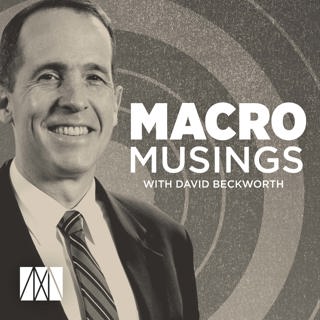
Brad Setser on Addressing the Global Dollar Shortage and COVID-19's Implications for Worldwide Trade Imbalances
Brad Setser is a senior fellow for international economics at the Council on Foreign Relations, where he works on macroeconomics, global capital flows, and financial crisis issues. Brad has previously served as the deputy assistant secretary at the U.S. Treasury, working on Europe's financial crisis, currency policy, financial sanctions, commodity shocks, and Puerto Rico's debt crisis, and was the director for international economics on the staff of the National Economic Council and the National Security Council. As a returning guest to the show, Brad joins Macro Musings once again to discuss dollars swap lines and other solutions to the global dollar shortage, the recent implications of COVID-19 on global trade imbalances, and how China should respond to the effects of this crisis. Transcript for the episode can be found here. Brad's Twitter: @Brad_Setser Brad's CFR profile: https://www.cfr.org/expert/brad-w-setser Related Links: Bonus segment with Brad Setser: https://youtu.be/YsdynQgWHFg *Addressing the Global Dollar Shortage: More Swap Lines? A New Repo Facility for Central Banks? More IMF Lending?* by Brad Setser https://www.cfr.org/blog/addressing-global-dollar-shortage-more-swap-lines-new-fed-repo-facility-central-banks-more-imf *Why the Dollar Crunch is (mostly) a Rich World Problem* by Claire Jones https://ftalphaville.ft.com/2020/03/24/1585041854000/Why-the-dollar-crunch-is--mostly--a-rich-world-problem/ David's blog: macromarketmusings.blogspot.com David's Twitter: @DavidBeckworth
15 Apr 202049min

Alex Tabarrok on COVID-19 Response Efforts, Proposals for Continued Recovery, and Lessons for the Future
Alex Tabarrok is a professor of economics at George Mason University and a research fellow at the Mercatus Center. Alex joins David Beckworth on the podcast to discuss how best to deal with COVID-19 and what lessons we can learn from it moving forward. Transcript for the episode can be found here. Alex's Twitter: @ATabarrok Alex's GMU profile: https://mason.gmu.edu/~atabarro/ Related Links: Bonus segment with Tabarrok: https://www.youtube.com/watch?v=tQUnnumgXvw&feature=youtu.be *Pandemic Policy in Developing Countries: Recommendations for India* by Shruti Rajagopalan and Alex Tabarrok https://www.mercatus.org/publications/covid-19-policy-brief-series/pandemic-policy-developing-countries-recommendations-india Chad Brown's PIIE archive, which include a series of articles related to COVID-19 and its impact on trade: https://www.piie.com/experts/senior-research-staff/chad-p-bown David's blog: macromarketmusings.blogspot.com David's Twitter: @DavidBeckworth
13 Apr 202054min

Ashoka Mody on COVID-19's Impacts on Global Trade, Credit Markets and the Broader Eurozone
Ashoka Mody is a professor of international economic policy at Princeton University, has formerly worked at the IMF and the World Bank, and is a returning guest to Macro Musings. In this episode, he joins David to discuss the global economic implications of COVID-19 and what it specifically means for Europe and the Eurozone. Transcript for the episode. Ashoka's Twitter: @AshokaMody Ashoka's Princeton profile: https://scholar.princeton.edu/amody/home Related Links: Cover of Ashoka's new paperback book: https://i.imgur.com/1IYWBAk.jpg Bonus segment with Ashoka Mody: https://www.youtube.com/watch?v=QZsAetHdzjA&feature=youtu.be *Charting the Crisis* by Ashoka Mody http://econbrowser.com/archives/2020/03/guest-contribution-charting-this-crisis *Euro Tragedy: A Drama in Nine Acts* by Ashoka Mody https://global.oup.com/academic/product/eurotragedy-9780199351381?cc=us&lang=en& *Credit Booms Gone Bust: Monetary Policy, Leverage Cycles, and Financial Crises, 1870-2008* by Alan Taylor and Moritz Schularick https://www.aeaweb.org/articles?id=10.1257/aer.102.2.1029 *European Monetary Unification* by Barry Eichengreen https://www.jstor.org/stable/2728243?seq=1 *Pandemics Depress the Economy, Public Health Interventions Do Not: Evidence from the 1918 Flu* by Sergio Correia, Stephan Luck, and Emil Verner https://papers.ssrn.com/sol3/papers.cfm?abstract_id=3561560 David's blog: macromarketmusings.blogspot.com David's Twitter: @DavidBeckworth
8 Apr 202055min

Peter Conti-Brown on the CARES Act and the Expanding Fed-Treasury Relationship in Response to COVID-19
Peter Conti-Brown – a legal scholar and financial historian at the University of Pennsylvania, as well as a Nonresident Fellow in Economic Studies at the Brookings Institution – returns to Macro Musings to discuss the new Fed-Treasury relationship that is emerging in the wake of the war against COVID-19. Peter and David breakdown the CARES Act, the aggressive and extensive policies recently taken by the Fed, and the implications for monetary policy moving forward. Transcript for the episode can be found here. Peter's Twitter: @PeterContiBrown Peter's Brookings profile: https://www.brookings.edu/author/peter-conti-brown/ Peter's Wharton profile: https://lgst.wharton.upenn.edu/profile/petercb/ Related Links: *Explaining the New Fed-Treasury Emergency Fund* by Peter Conti-Brown https://www.brookings.edu/research/explaining-the-new-fed-treasury-emergency-fund/ *What's the Fed Doing in Response to the COVID-19 Crisis? What More Could it Do?* by Jeffrey Cheng, Dave Skidmore, and David Wessel https://www.brookings.edu/research/fed-response-to-covid19/ *The Foreign Affairs of the Federal Reserve* by Peter Conti-Brown and David Zaring https://papers.ssrn.com/sol3/papers.cfm?abstract_id=3169870 *Longer-Run Economic Consequences of Pandemics* by Oscar Jorda, Sanjay Singh, and Alan Taylor https://www.frbsf.org/economic-research/files/wp2020-09.pdf Bonus segment featuring Peter Conti-Brown: https://youtu.be/GJF2RlQ8po4 David's blog: macromarketmusings.blogspot.com David's Twitter: @DavidBeckworth
6 Apr 20201h 1min

Skanda Amarnath, Yakov Feygin, and Elizabeth Pancotti on Municipal Bond Market Intervention and the CARES Act as Responses to COVID-19
Skanda Amarnath is the Director of Research and Analysis at Employ America, Yakov Feygin is the Associate Director of the Future of Capitalism program at the Berggruen Institute, and Elizabeth Pancotti is a research assistant at the National Bureau of Economic Research and at Tufts University. Together, they have put together proposals on how to better address the challenges of the COVID-19 crisis at the state and local level. They join Macro Musings today to discuss these proposals, a municipal bond market and expanded unemployment insurance, as well as what it all means for making the US economy more of an optimal currency area. Transcript for the episode can be found here. Skanda's Twitter: @IrvingSwisher Skanda's Medium profile: https://medium.com/@skanda_97974 Yakov's Twitter: @BuddyYakov Yakov's Berggruen Institute profile: https://www.berggruen.org/people/yakov-feygin/ Elizabeth's Twitter: @ENPancotti Elizabeth's website: https://sites.google.com/view/elizabethpancotti/home Related Links: *The Fed Can and Should Support State Government Efforts to Respond to COVID-19 Right Now* by Skanda Amarnath and Yakov Feygin https://medium.com/@skanda_97974/the-fed-can-and-should-support-state-government-efforts-to-respond-to-covid-19-right-now-5e5ecf7b7ed8 *Unemployment Benefit Expansions: A Guide for Policy Responses in the Wake of COVID-19* by Elizabether Pancotti https://medium.com/@employamerica/unemployment-benefit-expansions-a-guide-for-policy-responses-in-the-wake-of-covid-19-ec3da6e8701 David's blog: macromarketmusings.blogspot.com David's Twitter: @DavidBeckworth
1 Apr 202055min

Jim Bianco on Policy Responses to the Coronavirus: Details, Implications, and Concerns Moving Forward
Jim Bianco, of Bianco Research, joins Macro Musings to discuss the latest on the economic impact from the coronavirus. David and Jim discuss the details and implications of the $2 Trillion Relief bill, the possibility of higher inflation, renewed threats to Fed independence, and implications for the Eurozone. Transcript for the episode can be found here. Jim's Twitter: @biancoresearch Jim's Bloomberg archive: https://www.bloomberg.com/opinion/authors/ABvwE0aTOvg/jim-bianco Related Links: *The Fed's Cure Risks Being Worse Than the Disease* by Jim Bianco https://www.bloomberg.com/opinion/articles/2020-03-27/federal-reserve-s-financial-cure-risks-being-worse-than-disease David's blog: macromarketmusings.blogspot.com David's Twitter: @DavidBeckworth
30 Mar 20201h 1min

Robin Brooks on COVID-19's Impact on Emerging Markets and the Domestic Policy Response to the Crisis
Robin Brooks is a chief economist at the Institute of International Finance and has previously worked for Goldman Sachs and the IMF. Robin joins Macro Musings to talk about the global economic implications of the novel coronavirus. David and Robin also discuss what is happening to output gap measures, where the global dollar cycle stands today, and the importance of dollar swap lines for emerging markets. Transcript for the episode can be found here. Robin's Twitter: @RobinBrooksIIF Robin's IIF profile: https://www.iif.com/About-Us/Our-Leadership Related Links: *Federal Reserve Announces Extensive New Measures to Support the Economy* https://www.federalreserve.gov/newsevents/pressreleases/monetary20200323b.htm David's blog: macromarketmusings.blogspot.com David's Twitter: @DavidBeckworth
25 Mar 202053min

Stan Veuger on Helping Businesses Survive in the Post-Coronavirus Economy
Stan Veuger is a resident scholar at the American Enterprise Institute where he specializes in political economy and public finance. Stan joins us today to discuss his co-authored proposal to save American businesses and American jobs as well as his thoughts on how Europe is handling the crisis. Specifically, David and Stan discuss the Federal Reserve's ability to support targeted business loans, how the crisis has been panning out in Europe, and the timeline to global recovery. Transcript for the episode can be found here. Stan's Twitter: @stanveuger Stan's AEI profile: https://www.aei.org/profile/stan-veuger/ Related Links: *How to Help American Businesses Endure and Jobs Survive* by Stan Veuger and Steven Hamilton https://www.aei.org/economics/how-to-help-american-businesses-endure-and-jobs-survive/ *Throwing a COVID-19 Liquidity Life-Line* by Markus Brunnermeier, Jean-Pierre Landau, Marco Pagano, and Ricardo Reis https://scholar.princeton.edu/sites/default/files/markus/files/covid_liquiditylifeline.pdf David's blog: macromarketmusings.blogspot.com David's Twitter: @DavidBeckworth
23 Mar 202053min






















